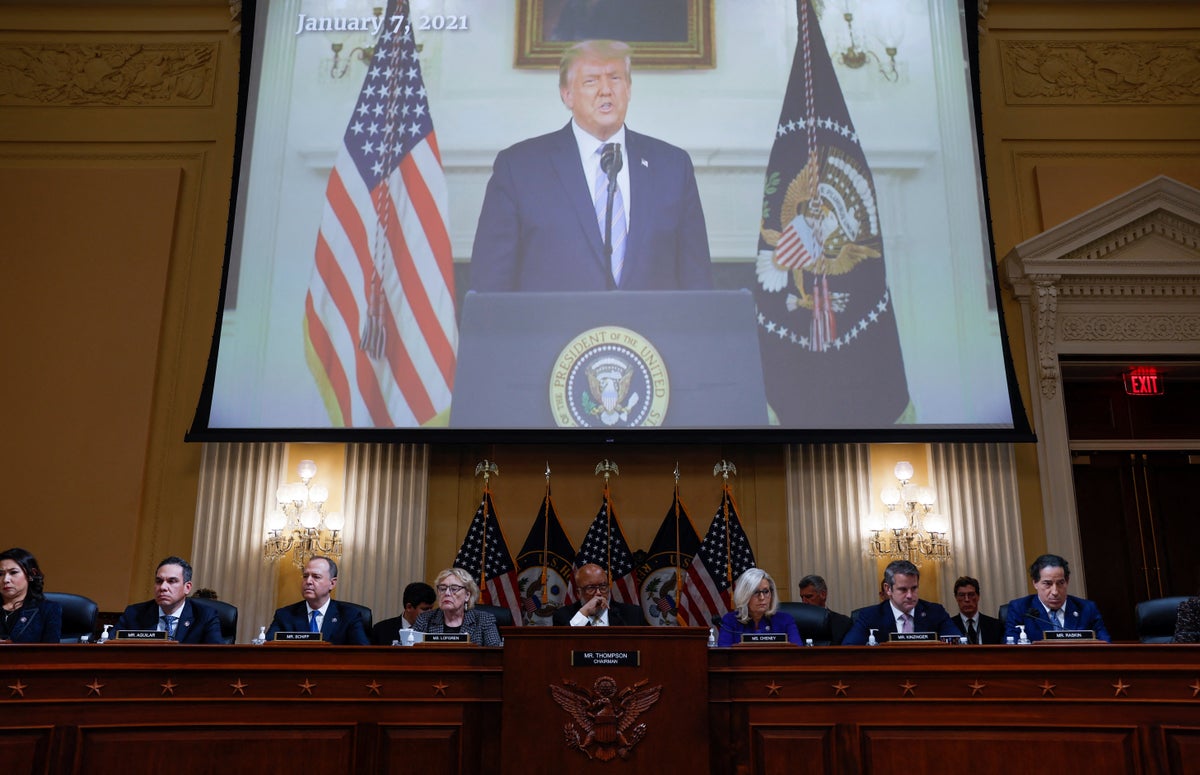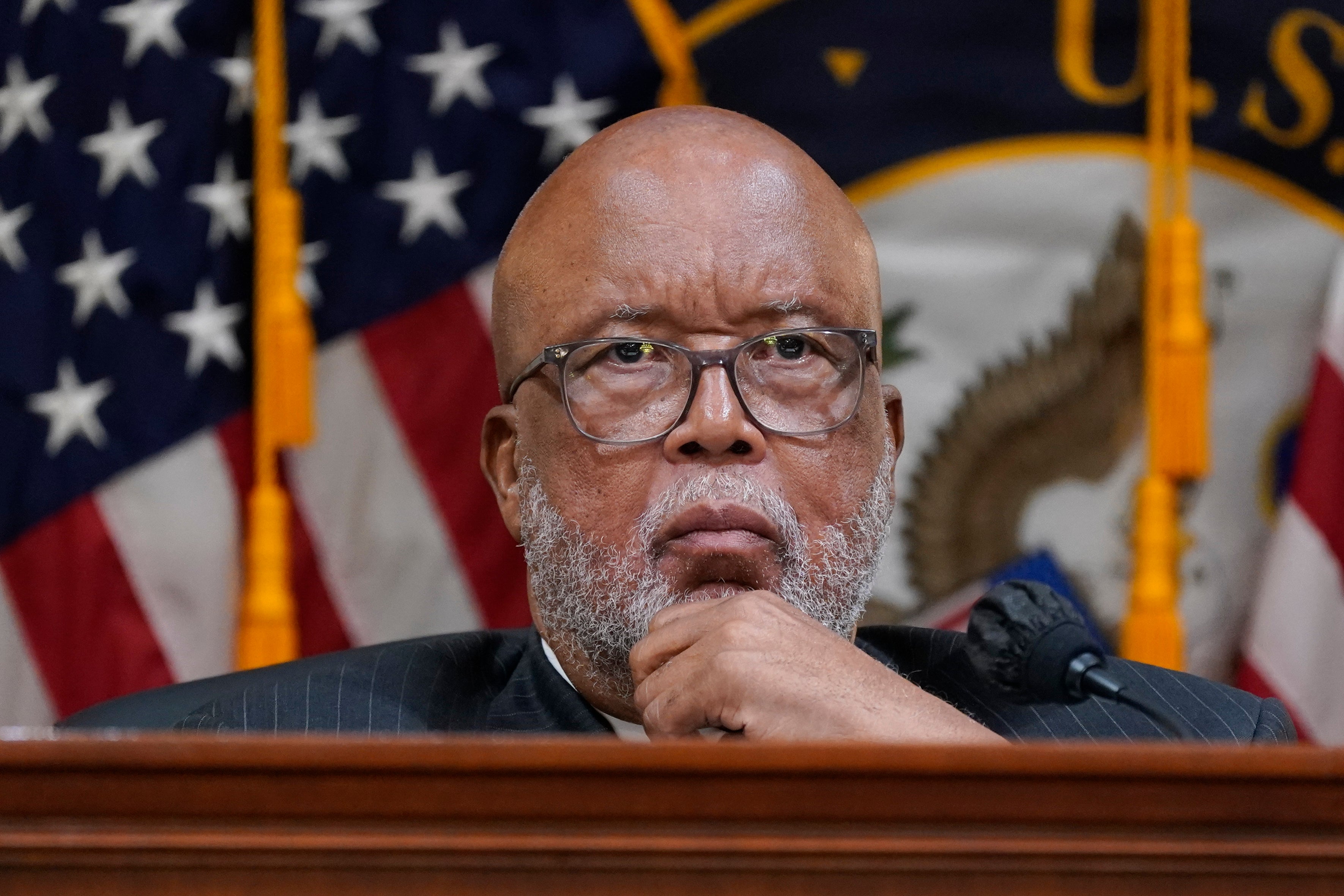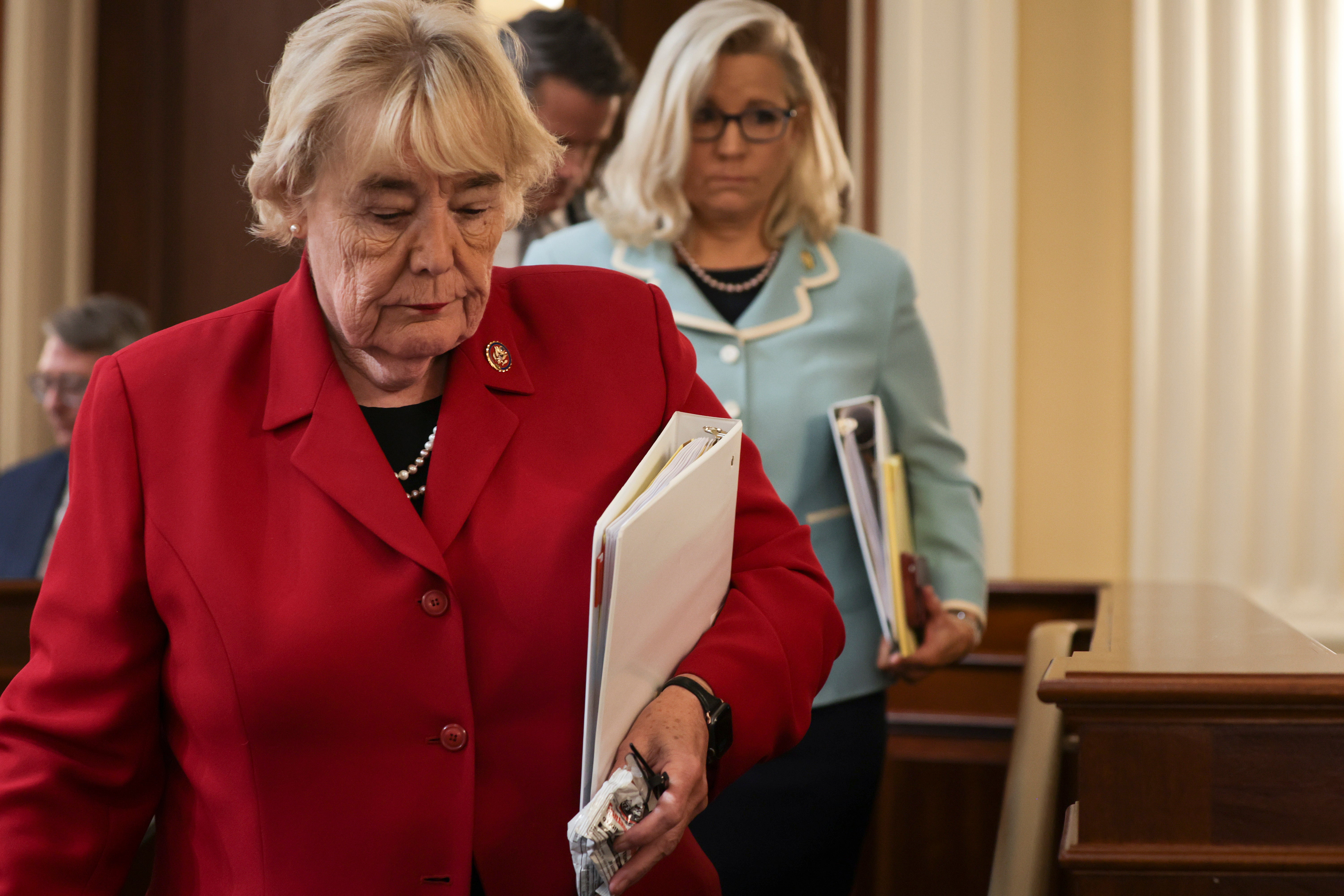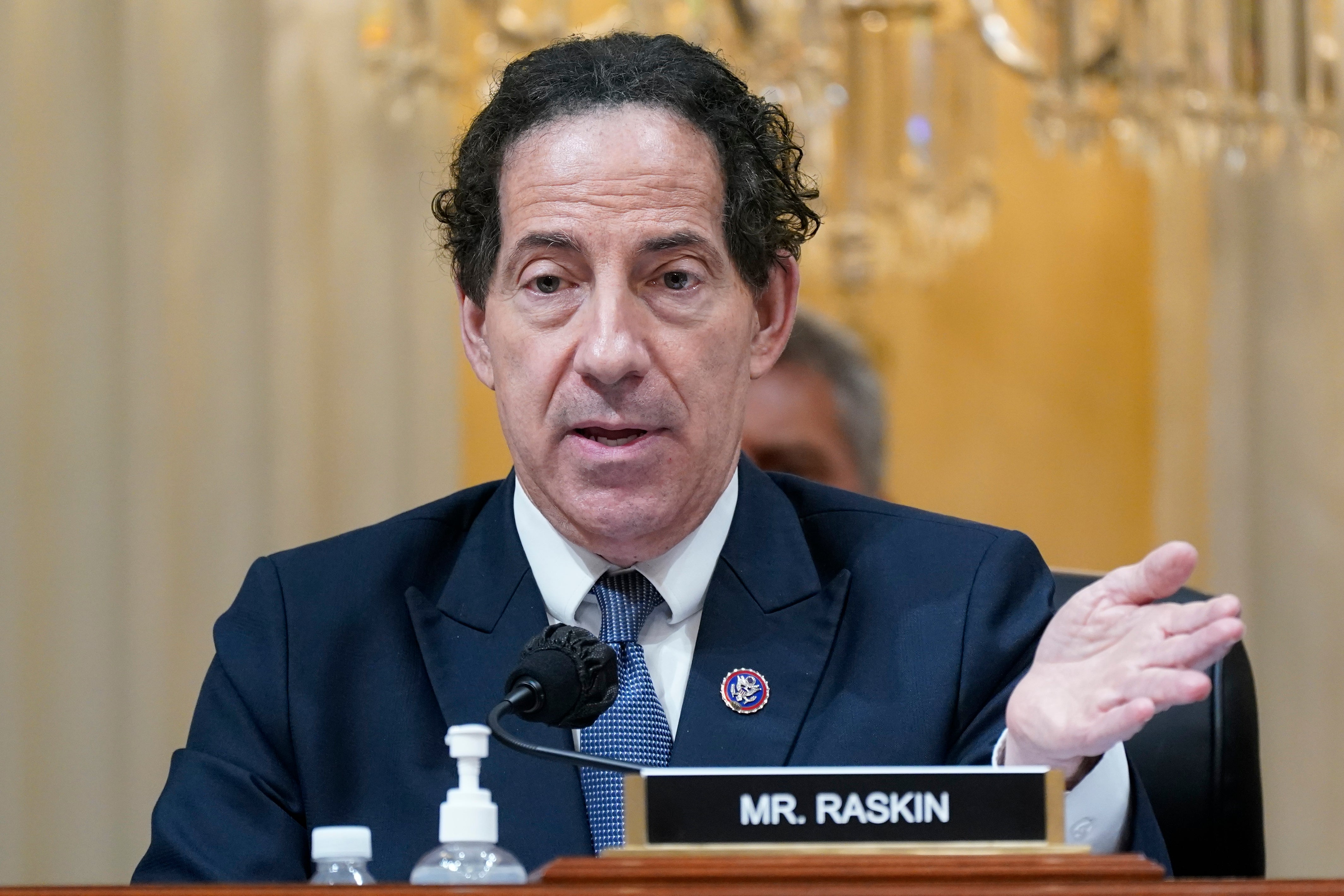
The House January 6 select committee has officially voted to refer former president Donald Trump to the Department of Justice for prosecution on charges stemming from alleged violations of at least five separate sections of the United States criminal code. The dramatic move brings an end to a 18-month investigation into his role in the Capitol riot and increasing the pressure against the twice-impeached ex-president and his recently announced 2024 presidential campaign.
The committee’s vote to refer Mr Trump for possible prosecution by Jack Smith, the DOJ special counsel who Attorney General Merrick Garland named last month to oversee multiple ongoing criminal investigations into the ex-president’s conduct, comes as he is also facing possible criminal charges for his alleged unlawful retention of national defence information at his Palm Beach, Florida residence. Mr Trump also faces an ongoing investigation by a special grand jury in Fulton County, Georgia, which is looking into his efforts to overturn his loss to Joe Biden in that state.
By unanimous consent, the committee voted to transmit the panel’s findings to Mr Smith, who in addition supervising the probe into Mr Trump’s possession of classified documents, is overseeing ongoing investigations into the ex-president’s attempts to overturn his 2020 election loss to Mr Biden. The panel also voted to adopt their final report, which will be released on Wednesday.
Speaking at the outset of the committee’s meeting — the last public act before its charter expires at the end of the 117th Congress — the panel’s chairman, Mississippi Representative Bennie Thompson, said Mr Trump’s actions showed how he “broke faith” with American democracy by refusing to accept his loss to Mr Biden and pushing to install himself in the White House for a second term regardless of the actual election results.
“To cast a vote in the United States is an act of faith and hope. When we drop that ballot in the ballot box, we expect the people named on the ballot are going to uphold that end of the deal. The winner swears an oath and oppose it. Those who come up short ultimately accept the results and abide by the rule of law. That faith and our system is the foundation of American democracy if the faith is broken, so is our democracy — Donald Trump broke that faith, he lost the 2020 election and knew it, but he chose to try to stay in office through a multi part scheme. to overturn the results and block the transfer of power,” he said.
Mr Thompson said the committee would be releasing its final report this week, as well as “the bulk of its non sensitive records” before the end of the year, to “allow the American people to see for themselves the body of evidence we gathered”.

“This committee is nearing the end of its work, but as the country we remain in strange and uncharted waters. We've never had a president of the United States stir up a violent attempt to block the transfer of power. I believe nearly two years later, this is still a time of reflection and reckoning. If we are to survive as a nation of laws and democracy, this can never happen again,” he continued, adding that the committee’s evidence “points to further action beyond the power of this committe”.
Mr Thompson further added that he and his colleagues have “every confidence that the work of this committee will help provide a roadmap to justice” for other agencies.
Disrupting the peaceful transfer of power
He was immediately followed in speaking by the committee’s vice-chair, Wyoming Representative Liz Cheney, who spoke of the reminder members of Congress receive of the importance of a peaceful transfer of power each time they walk through the Capitol’s central rotunda, where a large painting depicts George Washington resigning his commission and returning control of the Continental Army to civilian authorities at the end of the American Revolutionary War.
She said every US president since Washington has “defended this orderly transfer of authority” save for one – Mr Trump.
Ms Cheney said the day of the attack “was the first time one American president refused his constitutional duty to transfer power peacefully to the next,” and added that the panel’s “most shameful finding” was that Mr Trump had watched the attack in his private dining room and refused to intervene.

“For hours he would not issue a public statement instructing his supporters to disperse and leave the Capitol. Despite urgent pleas from his White House staff and dozens of others to do so. members of his family, his White House lawyers, virtually all those around him knew that this simple act was critical. For hours, he would not do it ... this was an utter moral failure and a clear dereliction of duty. Evidence of this can be seen in the testimony of President Trump's own White House counsel, and several other White House witnesses,” she said.
“No man who would behave that way, at that moment in time can ever serve in any position of authority in our nation again,” she added.
Each of the panel’s nine members delivered subsequent statements, presenting in turn summaries of the select committee’s findings, including new evidence developed since the committee’s last public hearing.
Trump ignored pleas to urge peaceful protest
In one portion of videotaped testimony, former counselor to the president Hope Hicks denied that a text message exchange she’d had with ex-Trump campaign press secretary Hogan Gidley, in which Mr Gidley said “he” — meaning Mr Trump — should tweet something encouraging his supporters to refrain from violence, referred to Mr Trump. Instead, she said the exchange reflected a conversation with Eric Herschmann, an attorney who was then serving as a senior adviser to Mr Trump.
Representative Stephanie Murphy of Florida said the public release of transcripts of Mr Herschmann’s testimony would allow the public to “see the perspective Eric Herschmann gave before we took Hope Hicks's testimony”. But when pressed by The Independent on whether Ms Hicks, who was one of Mr Trump’s most loyal aides during his presidency, had committed perjury in her appearance before the panel, multiple committee members declined to say so outright.
Ms Murphy also presented testimony from ex-Trump adviser Kellyanne Conway, in which Ms Conway said Mr Trump didn’t appear to believe the rioters did anything wrong during a conversation she had with him the day after the riot.

Committee details criminal referrals
Another committee member, California Representative Zoe Lofgren, said the panel had obtained testimony which strongly suggests that Mr Trump’s political organisation has been using funds raised during the period when Mr Trump was claiming the election was stolen from him to pay for legal representation for ex-Trump officials subpoenaed to appear before the committee.
Maryland Representative Jamie Raskin, a former constitutional law professor who led House managers during Mr Trump’s second impeachment trial, said a subcommittee made up of the panel’s lawyers had recommending making referrals for prosecution based on “the gravity of the specific offense, the severity of its actual harm, and the centrality of the offender to the overall design of the unlawful scheme to overthrow the election”.
He said the “starting point” for the panel’s analysis was a finding by a California-based federal judge that it was more likely than not that Mr Trump and attorney John Eastman had violated laws against obstructing official proceedings.
“We believe that the evidence described by my colleagues today and assembled throughout our hearings, warrants a criminal referral of former president Donald J Trump, John Eastman and others for violations of this statute,” he said. “The whole purpose and obvious effect of Trump's scheme were to obstruct influence and impede this official proceeding, the central moment for the lawful transfer of power in the United States”.
Mr Raskin also said there is “there is more than sufficient evidence” to refer Mr Trump and others for prosecution for violating laws against conspiracy to defraud the United States, “to make an agreement to impair, obstruct, or defeat the lawful functions of the United States government by deceitful or dishonest means”.
“Former President Trump did not engage in a plan to defraud the United States acting alone. He entered into agreements formal and informal with several other individuals who assisted him with his criminal objectives. Our report describes in detail the actions of numerous co conspirators who agreed with and participated in Trump's plan to impair obstruct and defeat the certification of President Biden's electoral victory,” he said.
He also said Mr Trump and others should be referred for prosecution for violating portions of the law “which makes it unlawful to knowingly and willfully make materially false statements to the federal government” and violating laws levying penalties against any person who “incites assist or engages in insurrection against the United States of America and anyone who gives aid or comfort to an insurrection”.

“The committee believes that more than sufficient evidence exists for a criminal referral of former President Trump for assisting or aiding and comforting those at the Capitol who engaged in a violent attack on the United States. The committee has developed significant evidence that President Trump intended to disrupt the peaceful transfer transition of power under our Constitution. the president has an affirmative and primary constitutional duty to apps to take care that the laws be faithfully executed. Nothing could be a greater betrayal of this duty than to assist in insurrection. against the constitutional order,” he said. Mr Raskin added that he and his colleagues “trust that the Department of Justice will be able to form a far more complete picture through its own investigation”.
Inside the committee’s report
In an introduction to the panel’s final report obtained by The Independent, the committee said the “breadth of evidence” obtained over the course of its probe warranted referrals because the Justice Department “and other prosecutorial authorities may be in a position to utilize investigative tools, including search warrants and grand juries,” that would be “superior” to Congress’ mechanisms for obtaining information.
The report, approved by the nine committee members — all seven Democrats plus Republicans Liz Cheney and Adam Kinzinger — stated that in the committee’s judgement, Mr Trump “believed then, and continues to believe now, that he is above the law, not bound by our Constitution and its explicit checks on Presidential authority,” and noted that Mr Trump’s recent call to terminate “all rules, regulations and articles, even those found in the Constitution” — and his repeated suggestions that anyone charged criminally as a result of the Department of Justice’s investigation into the Capitol attack should be pardoned — has “heightened” their concerns.
“If President Trump and the associates who assisted him in an effort to overturn the lawful outcome of the 2020 election are not ultimately held accountable under the law, their behaviour may become a precedent and invitation to danger for future elections. A failure to hold them accountable now may ultimately lead to future unlawful efforts to overturn our elections, thereby threatening the security and viability of our Republic,” they wrote.
To start, the panel said the department should consider bringing charges against Mr Trump for violation of the section of the US code making it a crime to obstruct an official proceeding of the US government because numerous federal judges have found the quadrennial joint session that was interrupted by the January 6 riot qualifies as such a proceeding.
“There should be no doubt that President Trump knew that his actions were likely to “obstruct, influence or impede” that proceeding. Based on the evidence developed, President Trump was attempting to prevent or delay the counting of lawful certified Electoral College votes from multiple States,” the committee said, adding that Mr Trump had been “directly and personally involved in this effort” because he’d “personally” pressured then-Vice President Mike Pence to hijack the joint session by unilaterally throwing out electoral votes from swing states won by Mr Biden.
The committee also said Mr Trump “acted with a ‘corrupt’ purpose” because he knew Mr Pence had been advised by counsel that he had no such authority.
“In addition, President Trump knew that he had lost dozens of State and Federal lawsuits, and that the Justice Department, his campaign and his other advisors concluded that there was insufficient fraud to alter the outcome. President Trump also knew that no majority of any State legislature had taken or manifested any intention to take any official action that could change a State’s electoral college votes. But President Trump pushed forward anyway,” the committee said.
They further explained that Mr Trump was “also responsible for recruiting tens of thousands of his supporters to Washington for January 6th, and knowing they were angry and some were armed, instructing them to march to the Capitol and ‘fight like hell’”.

“And then, while knowing a violent riot was underway, he refused for multiple hours to take the single step his advisors and supporters were begging him to take to halt the violence: to make a public statement instructing his supporters to disperse and leave the Capitol,” they said, adding that Mr Trump had “delayed the vote count” through “action and inaction”.
Committee members also voted to refer Mr Trump for prosecution under a criminal statute making it unlawful to conspire to defraud the United States because Mr Trump “entered into an agreement with individuals to obstruct a lawful function of the government (the certification of the election)” by having “engaged in a multi-part plan described in this Report to obstruct a lawful certification of the election,” and for having conspired to make false statements by causing fake electoral college certificates to be transmitted by GOP activists to the National Archives, in hopes that the existence of the fraudulent documents could be used by Mr Pence in carrying out the plan to hijack the congressional vote counting session.
To add to the unprecedented volume of criminal charges the panel believes could be brought against the ex-president, members also voted to authorise a referral for violating statutes levying criminal penalties against any person who “incites, sets on foot, assists, or engages in any rebellion or insurrection against the authority of the United States or the laws thereof, or gives aid or comfort thereto”.
The committee wrote that the law does not require Mr Trump to have entered into an agreement with any of the rioters.
“Instead, the President need only have incited, assisted or aided and comforted those engaged in violence or other lawless activity in an effort to prevent the peaceful transition of the Presidency under our Constitution,” they said, noting that Mr Trump’s now-infamous speech calling out Mr Pence to show “courage” and follow through with his unlawful plan — and his tweet that day excoriating Mr Pence for not doing so — “created a desperate and false expectation in President Trump’s mob that ended up putting the Vice President and his entourage and many others at the Capitol in physical danger”.
“When President Trump tweeted at 2.24 pm, he knew violence was underway. His tweet exacerbated that violence,” they said.
They further argued that Mr Trump could potentially be prosecuted under the “seditious conspiracy” statutes which have now been used against members of two extremist groups — the Proud Boys and Oath Keepers — which participated in the attack on the Capitol, and suggested that the Department of Justice could use its’ investigatory tools to develop further evidence supporting such a prosecution.
Following the meeting’s conclusion, Mr Raskin told reporters the panel had declined to specifically refer Mr Trump for prosecution on seditious conspiracy charges because the committee only “brought forth ... offenses where we think it's just clear that criminal conduct took place”.
“It's not to the exclusion of others, It's very possible that the Department of Justice would have further evidence that support charges of seditious conspiracy,” he added.
Mr Raskin also told reporters the panel would be providing the department with “material that has raised concerns in terms of the credibility of witnesses generally, as well as the role that some of the lawyers representing the former president's interests may have played in trying to influence the testimony of the witnesses”.







